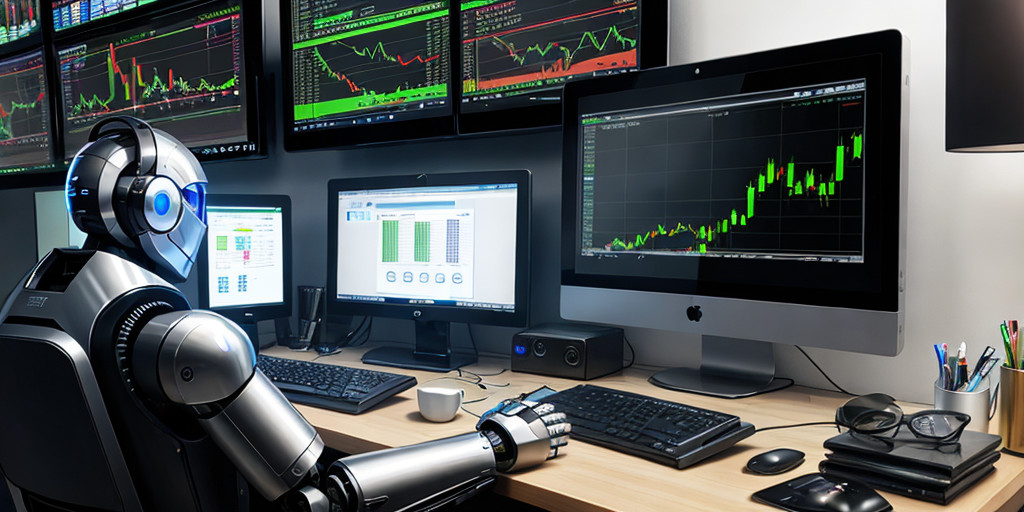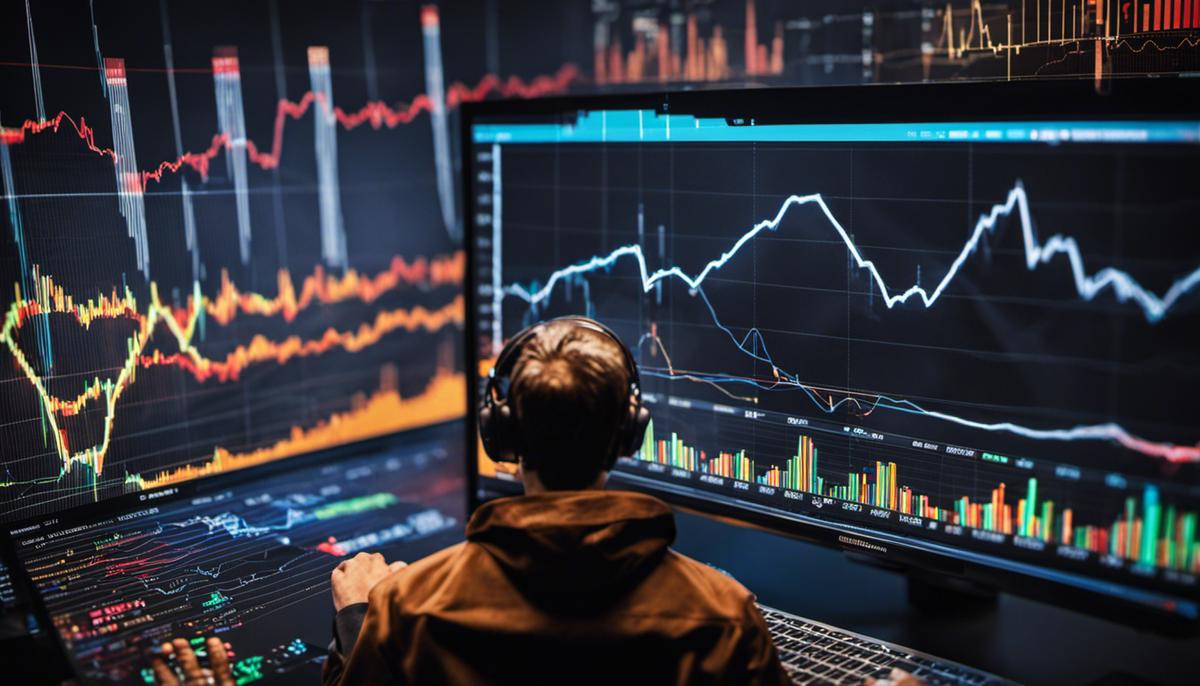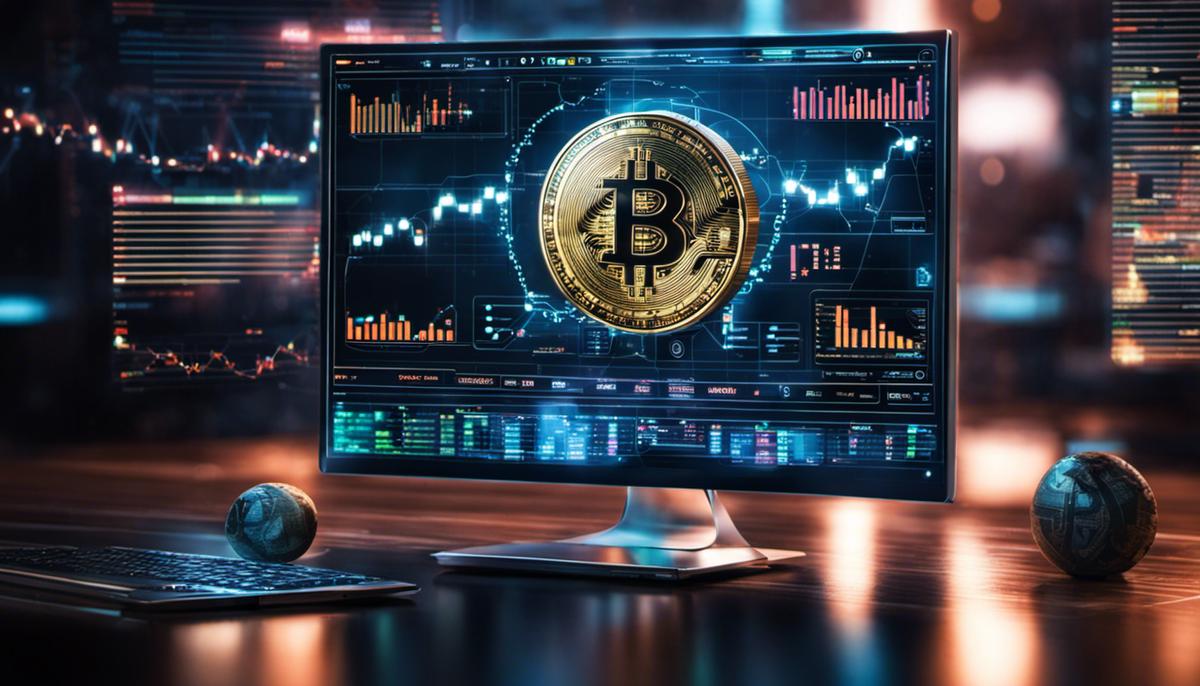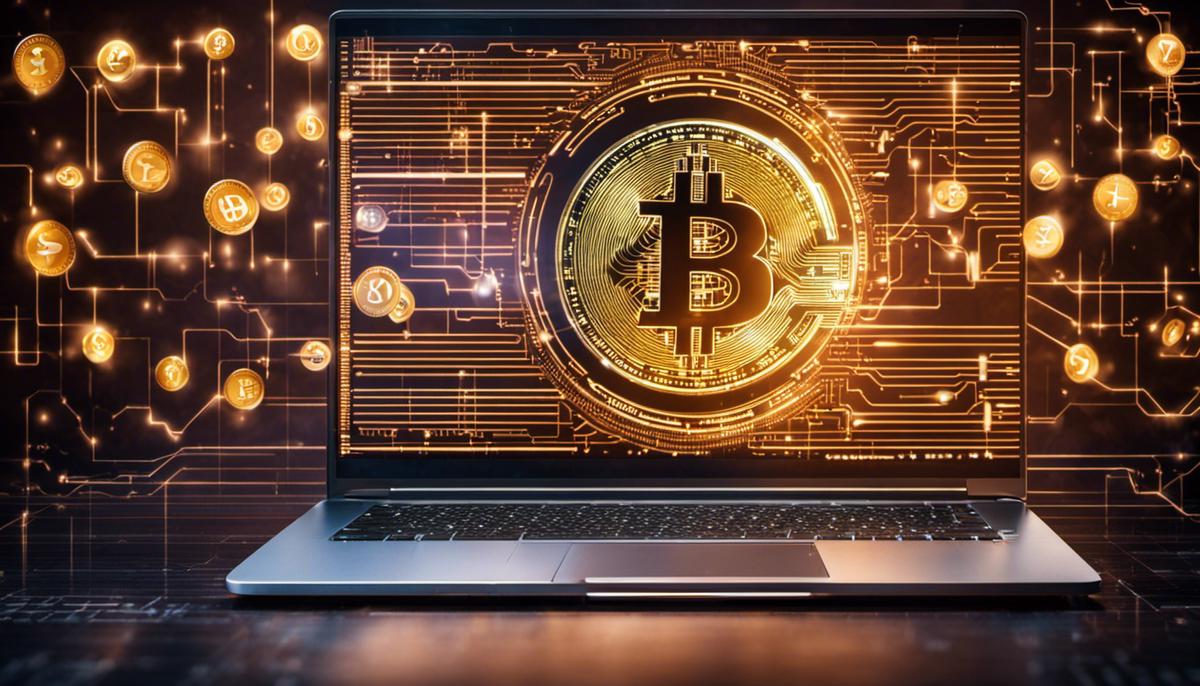Understanding AI Crypto Trading: A Comprehensive Guide
A world of finance powered by artificial intelligence and blockchain technology isn’t just a scene out of a futuristic movie. It’s here, and it’s revolutionizing the face of cryptocurrency trading. This digital arena is constantly evolving, and to stay afloat, understanding and leveraging AI’s resourcefulness is imperative. In this exploration, we delve into the intersection of artificial intelligence and cryptocurrency trading, seeking clarity on enthralling concepts like machine learning and complex algorithms. From discerning the role of AI in cryptocurrency trading to evaluating the myriad of associated benefits and risks, we will scrutinize AI’s implications in this rapidly evolving industry. In addition, we’ll shed light on prevalent AI-enabled tools and platforms that are streamlining crypto transactions and draw insights into the future of AI in crypto trading.
Basics of AI and Crypto Trading
The Intersection of Artificial Intelligence (AI) and Crypto Trading
AI and cryptocurrency trading are two advanced technologies that, when merged, can open up innovative avenues for investors. Artificial Intelligence, commonly known as AI, is a branch of computer science that involves the development of computer systems that can mimic human intelligence. It holds a wide array of applications ranging from voice recognition to decision-making.
Understanding Crypto Trading
Cryptocurrency trading, on the other hand, is the act of speculating on cryptocurrency price movements via a CFD trading account or buying and selling the underlying coins via an exchange. Cryptocurrencies are digital or virtual currencies that use cryptography for security. Bitcoin, Ethereum, and Ripple are all examples of cryptocurrencies. Crypto trading involves buying these digital assets at a lower price and selling them when their prices rise.
AI in Crypto Trading
AI plays a critical role in crypto trading in various ways. Firstly, legacy trading systems were not designed to handle the volatility and speed of the crypto market. AI algorithms, on the other hand, are not only designed to handle massive amounts of data in real time but also to make split-second trading decisions.
Automated Trading
One of the applications of AI in cryptocurrency trading is automated trading. Automated trading, as its name suggests, is the process of letting AI algorithms make trading decisions on your behalf. These systems are designed with a predefined set of rules and strategies that guide their operation. They track market prices, decide when to buy or sell, and can even submit these decisions automatically.
Machine Learning and Predictive Analysis
Machine Learning, a subset of AI, plays a crucial role in predictive analysis in crypto trading. Machine Learning systems are trained using large amounts of data, which they then use to predict possible future outcomes. They are used in crypto trading to predict future price movements based on past market data.
Risk Management
AI and Machine Learning are also applied in risk management within crypto trading. Risk management involves identifying, assessing, and prioritizing uncertainties in investment decisions. AI applications are leveraged to determine the level of risk associated with different investments and help in making informed trading decisions.
Crypto Trading Bots
AI has also enabled the use of crypto trading bots – programs that buy and sell cryptocurrencies automatically. These bots conduct trades based on a range of factors such as market trends, volatility, and other relevant indices. They enable traders to execute trades around the clock, thus taking advantage of all potential trading opportunities.
Artificial Intelligence (AI) is not simply a matter of futuristic fancy but is presently reshaping the world of crypto trading. Trading digital currencies are notoriously complex, but AI is breaking down these barriers and making the process more accessible and lucrative. This is true for both institutional investors and private individuals navigating the financial seas.

Role of AI in Cryptocurrency Trading
The Impact of AI on Cryptocurrency Trading: A New Dawn
As cryptocurrencies – digital currencies that utilize complex cryptography for security and function independently of any central bank – continue to permeate the financial market, AI’s influence continues to expand. The inclusion of AI in the cryptocurrency market has revolutionized the way in which trades are processed. AI allows traders to make data-based decisions rather than simply following their gut, eliminating the potential for emotional factors or bias to muddy the waters.
Trading Algorithms and Machine Learning
AI-based trading technologies typically utilize two methodologies – algorithms and machine learning. Algorithms are sets of instructions for carrying out a task. In crypto trading, they can be programmed to execute trades based on specific parameters such as currency price and trade volume. These algorithms can process vast amounts of data at lightning speed to identify profitable trade opportunities.
On the other hand, machine learning, a subset of AI, enables computers to learn from data without being explicitly programmed. It can adapt to new inputs, a trait ideally suited to the highly volatile and unpredictable world of cryptocurrency trading. With machine learning, trading models can use historical data to predict future market trends. These predictions help traders identify the best time to buy or sell.
Predicting Market Trends and Minimizing Risks
The profound use of AI in cryptocurrency trading is its ability to predict market trends. AI’s predictive analytics involves using data, statistical algorithms, and machine learning techniques to identify the likelihood of future outcomes. It can forecast market movements by analyzing social media sentiment, news, and other market-relevant information. Such forecasting helps traders seize profitable trading opportunities and avoid potential losses.
Furthermore, AI can minimize risks in crypto trading. While the world of cryptocurrency is notoriously volatile, the advanced analytics provided by AI can help mitigate potential losses. AI systems can analyze and learn from past events to improve the prediction and management of risk in a timely way. This risk management aspect is critical to ensuring the sustainability and profitability of trading operations.
Maximizing Profits in Crypto Trading
The goal of any trading operation is to maximize profits, and AI can significantly aid in achieving this goal in crypto trading. AI can optimize trading strategies based on historical data and real-time market conditions, making trading more efficient and profitable. For example, high-frequency trading (HFT), which uses complex algorithms to rapidly execute trades, can be made more effective through AI, allowing traders to capitalize on even the smallest market movements
Furthermore, AI-based trading bots have become immensely popular in crypto trading. These bots can operate 24/7, making trades based on set parameters and continually adjusting based on market conditions. Moreover, they eliminate the potential for human error and emotion-based trading decisions, resulting in a higher probability of profitable trades.
The importance of Artificial Intelligence (AI) in the rapidly evolving world of cryptocurrency trading cannot be understated. Its ability to crunch extensive data sets, predict market movements, adapt to risk, and execution of trades with efficiency has all contributed to an ongoing transformation of the crypto trading sector.

Benefits and Risks of AI in Crypto Trading
Exploring the Benefits of AI in Crypto Trading
The most profound benefit of employing AI in cryptocurrency trading lies in its capacity to digest and interpret vast volumes of data in what seems like an instant. Unlike traditional traders, who are vulnerable to emotional reactions and may become fatigued, AI algorithms work around the clock, processing complex data in real time. This functionality provides traders with the means to make informed trading decisions swiftly and efficiently.
Equally important is the algorithm’s knack for discerning patterns and trends, which are often challenging to detect in humans. Armed with the insights gleaned from historical data, AI can establish market patterns, learn and evolve based on them, and even forecast future trends. In the unpredictable world of cryptocurrency markets, this foresight can prove extremely beneficial, potentially amplifying returns on investments.
By eliminating the risk of human error in trading through automation, AI significantly reduces potential mishaps including wrong trade execution and other expensive errors, delivering yet another level of reliability and security in crypto trading.
Risks of AI in Crypto Trading
Despite the promising advantages, there are also notable risks associated with using AI in crypto trading. One significant concern is the over-reliance on technology. Traders should not forget that AI systems are as good as the data they are trained on and the logic that has been encoded by their human creators – neither of which is infallible.
The potential vulnerability of AI systems is another pressing issue. If an AI system is compromised, this could lead to fraudulent trades, theft of cryptocurrencies, or other malicious activities. Additionally, because AI systems can execute trades much faster than humans, a compromised system could wreak havoc on one’s trading account within a very short time.
Another risk factor is the lack of human judgment in AI trading. While it’s true that AI reduces emotional trading decisions, there are times when human intuition, based on years of experience, cannot be replaced by an algorithm. For instance, an AI system might not be able to accurately evaluate the impact of a sudden political event or a technological breakthrough on cryptocurrency prices.
To draw the curtain close, it’s pivotal to note that even though AI introduces notable enhancements in the domain of cryptocurrency trading, it can’t mitigate every potential risk in the trading chain. Traders should judiciously leverage these cutting-edge technologies, comprehending the pros and cons while keeping abreast of market twists and technological advancements.

Current Tools and Platforms on AI Crypto Trading
The Role of AI in Cryptocurrency Trading: A Synopsis
A prominent technology, Artificial Intelligence (AI), boasts the capacity to swiftly scrutinize massive data points. It can formulate logical conclusions based on this analysis and continually learn from identified patterns and associations. Its features are a perfect match for the tumultuous and ever-progressing world of cryptocurrency trading. In the contemporary trading landscape, there exists a multitude of AI-based tools and platforms designed to support astute traders in steering the often unpredictable cryptocurrency markets.
Popular AI-Powered Crypto Trading Platforms
One of the most popular AI-powered crypto trading platforms is AlgoTrader. This platform uses AI algorithms to automate and optimize crypto trading. It can analyze market trends, make predictions, automate buying and selling actions, and adapt to changes in market conditions. As a result, traders using AlgoTrader can maximize their profit potential while minimizing risk.
TradeSanta is another AI-based crypto trading platform. Its AI bot can execute trades around the clock, analyze over 20 technical indicators to generate buy/sell signals, and use a variety of automated risk management strategies. This helps traders remain active in the market regardless of time zone restrictions and protects against significant losses.
The Role of AI in Crypto Trading
AI plays a critical role in crypto trading by providing the capacity to monitor vast amounts of data and predict market trends accurately. Through Machine Learning (ML), it can analyze past and current market data to make accurate predictions about future price movements. For instance, platforms like Coinrule use ML algorithms to predict future price trends, thus informing their trading decisions.
AI and Risk Management in Crypto Trading
Risk management is another important area in which AI tools play a crucial role. These tools use complex algorithms to automatically execute trades and manage investment portfolios, reducing the potential for human error and facilitating more efficient and profitable trading. Platforms like NapBots offer AI-powered bots that automatically manage your crypto portfolio. These bots assess the risk level of different investments and adjust trading strategies accordingly.
The Current Scope and Potential of AI in Crypto Trading
With the continuous advancement of AI technology, its influence in the sphere of cryptocurrency trading is destined to expand further. More sophisticated AI frameworks, such as deep learning, are being utilized to elevate predictive accuracy and fortify risk management processes. Deep learning algorithms are adept at handling complex datasets and producing precise predictions concerning upcoming market trends. Alongside the steady rise and the broader acceptance of cryptocurrencies, this clearly points towards a promising and opportunity-rich future of AI in crypto trading.
The superior analytical skills, predictive abilities, and automation potential of AI technologies transform the landscape of crypto trading. Traders who leverage these advanced tools and platforms not only have the possibility of navigating the often unpredictable crypto market with confidence but potentially securing substantial profits as well. Nonetheless, as with all kinds of investments, it’s vital to grasp the possible risks and conduct in-depth research before delving into crypto trading.

The Future of AI in Crypto Trading
The Prospects of AI in the Evolution of Crypto Trading
In numerous sectors, artificial intelligence has proven to be a pioneering strength, and crypto trading stands as a pivotal example. The idea of AI-guided automated trading through bots is progressively gaining traction and approval in the world of cryptocurrencies. This concept liberates traders from the responsibility of carrying out recurrent, manual, and risky trades, empowering them to develop effective strategies supported by thorough data analysis.
Rapid Technological Advancements
Technological advancements underpin the future of AI in crypto trading. As machine learning algorithms enhance and blockchain technology evolves, it is projected that AI will integrate more seamlessly. In essence, there could be a situation where trades are completed, tracked, and even settled automatically using AI agents. However, the scaling of technological challenges would be a critical element as current systems may grapple with the increasing volume and complexities of transactions.
AI: A Game Changer for Decisions and Careers in Trading
The implications of AI in decision-making and careers within trading could be monumental. As decision-making shifts from manual discretion to AI-driven insights, traders with hands-on technical and decision skills in AI would be in high demand. One aspect to note, however, is that traders who rely heavily on instinct and personal judgment might find it demanding to adjust.
In the career aspect, trading could see an influx of professionals from technical backgrounds like data science and computer engineering. They would be key in the design, development, and maintenance of AI trading systems, making them integral to the future of trading.
Regulatory Landscape
Regulation, or its absence, is considered a double-edged sword in the crypto industry. On the one hand, a lack of regulation attracts investors keen on pursuing high-risk, high-yield strategies. On the other hand, it discourages conservative players from seeking stability and security assurances. As AI and crypto trading continue to evolve, adjusting regulations in tune with the changing landscape will be paramount. Decentralized finance and cryptocurrencies under the purview of international regulatory bodies could bring stability and trust to investors.
Potential Risks
As with any disruptive technology, AI’s integration in crypto trading brings potential risks as well. With automated trading, there’s an inherent vulnerability to bugs, errors, and algorithmic mismatches in the trading bot. Additionally, a sophisticated AI system could be a prime target for cyberattacks, as it would control significant cryptocurrency resources. Thus, future developments would need to focus on iron-clad cybersecurity measures to ensure secure and trustworthy AI trading.
Increased Accessibility and Efficiency
AI promises to drastically increase accessibility and efficiency in crypto trading. Trades could be settled promptly and securely with minimal human intervention. The growing integration of AI bots will also democratize trading by enabling even those without financial acumen to invest and participate effectively in the market, representing a paradigm shift in democratized finance.

The future of AI in cryptocurrency trading is likely to be as dynamic and unpredictable as the markets themselves. However, one thing seems certain: AI lies at the heart of this digital revolution. It is the champion driving efficiency, speed, and precision in managing diverse and complex crypto transactions. It underpins a plethora of tools and platforms, providing traders with invaluable insights for informed decision-making. Nevertheless, with technology’s might, comes the question of reliability and potential risk. It’s a delicate balance, calling for a keen understanding and careful maneuvering. As we look toward the horizon, let’s endeavor to match pace with this evolution, embracing the potential of AI, challenging its shortcomings, and continuously seeking innovative avenues to redefine the trading experience.

